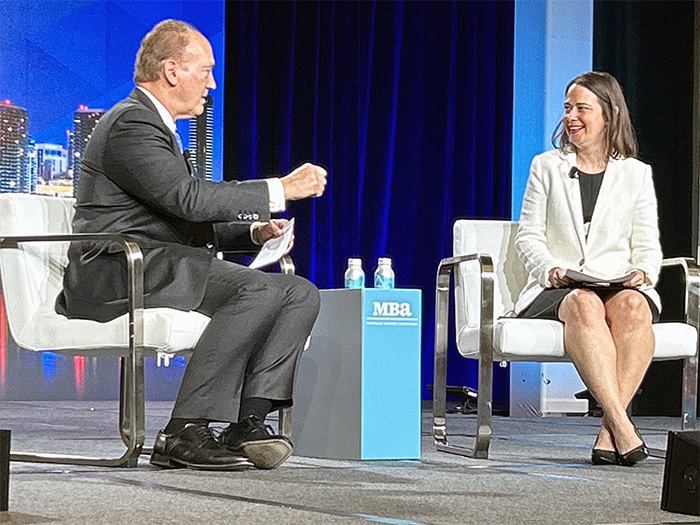
FHFA to Host Multifamily Insurance Symposium; Agency Official Talks Other 2024 Priorities–#MBACREF24

(Mark Jones, left, and Siobhan Kelly; Image by Anneliese Mahoney)
SAN DIEGO–Amid rising premiums and natural disasters, it’s no surprise that insurance is a big concern for the multifamily industry. With that in mind, the Federal Housing Finance Agency’s Siobhan Kelly, Associate Director of the Office of Multifamily Analytics and Policy, announced the agency will hold a multifamily insurance symposium March 13–with both in-person and virtual options–to brainstorm solutions to insurance issues.
“We’re hoping to bring together multifamily stakeholders, lenders, servicers, borrowers, commissioners, insurance carriers, consumer groups and federal representatives to really kind of address and have conversations on this topic,” Kelly said.
Kelly spoke Feb. 12 at the MBA Commercial/Multifamily Finance Convention and Expo here, also providing updates on other key priorities for the agency this year during an on-stage interview with Mark Jones, 2024 MBA Chairman and President of Union Home Mortgage.
For one, Kelly provided an update on FHFA efforts on workforce housing. “At FHFA, we have encouraged the enterprises to preserve affordability and workforce housing by financing loans on properties with rent or income restrictions,” she said.
Kelly highlighted that in 2023, FHFA created a new mission-driven category that was to support the preservation of workforce housing.
For 2024, FHFA is allowing loans that preserve workforce housing to be exempt from the multifamily cap of $70 billion, in the hopes of boosting Freddie Mac and Fannie Mae’s abilities to do as much business as they can in that space.
Jones asked how MBA and the industry can help with those vital efforts; Kelly said it’s all about raising awareness, and encouraged all in the industry to help get the word out on various applicable programs.
On the broader multifamily front, Kelly highlighted updates on recent changes to multifamily affordable housing goals for the enterprises from numeric targets to percentage targets.
“Setting the benchmarks as a percentage share ensures that the enterprises continue to adequately support the affordable segment of the housing market in years where acquisitions increase, and then they also ensure that the goals remain feasible in years where acquisitions decrease. I feel 2023 was a perfect example of that due to market challenges,” Kelly said.
She also noted that FHFA plans to propose new multifamily housing goals later this year, and the agency is looking forward to hearing from industry members during the comment period.
Tenant protections also are on the discussion docket for 2024, with an FHFA request for input having wrapped up in mid-2023.
The RFI garnered the most comments in the agency’s history on a topic, with about 7,000 comments total, 4,000 of which were unique. FHFA released a summary of those comments, and Kelly noted there were some clear central themes, including concerns from renters about rising rental prices and inadequate housing conditions.
From a housing provider’s perspective, FHFA also identified clear takeaways: namely worries about increasing costs and compliance burdens, and that a “one size fits all” approach may not work for tenant protections.
Kelly shared some next steps. For example, she pointed to a focus on helping tenants better access information and evaluating ways for the enterprises to provide tenants with information on resources, including through existing tools.
She also listed working with the enterprises to issue guidance on a 30-day notice to vacate, and improving data collection and public dialogue on the issue overall.
Another high priority for FHFA Director Sandra Thompson is asset management, Kelly said, in response to a question from Jones about multifamily servicing and the health of some properties.
Kelly noted that a reliance on virtual inspections during the COVID-19 pandemic may have played a role, but it’s also a problem that doesn’t seem to be going away.
However, she said, “it’s something that we’re working closely with the enterprises on–it’s part of their 2024 conservatorship scorecard, they are going to be strengthening their asset management capabilities.”
